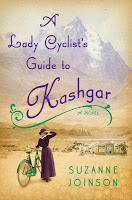The Unfinished Work of Elizabeth D. by Nicole Bernier
(Crown, June 2012)
When Kate’s friend Elizabeth dies in a plane crash, Kate
finds herself the keeper of Elizabeth ’s
journals and must decide what to do with them and the secrets they
contain. As Kate reads the journals
while on her family beach vacation, she reminisces about the Elizabeth
she knew and the times they spent together, but learns more about Elizabeth through the
journals than readers learn about Kate who is still alive. Elizabeth ’s
plane crash occurred just before September eleventh, and Kate is reading the
journals the following summer as she wrestle with the decision to return to her
career as a pastry chef or continue being a full time mother. Through Elizabeth’s journals, Kate learns of
Elizabeth’s difficult teenage years, the time as a young wife and mother when
she was robbed because of an incautious act, and that the secret trips that
Elizabeth’s husband assumed where to meet a lover were something entirely
different, something that her friends and family may feel cheated for not
knowing about when she was alive. While
Bernier explores the secrets we keep and the persona we put on for others,
sometimes, even for those closest to us, this is a very introspective novel and
there is not as much character development as might be expected from a story
such as this.

























